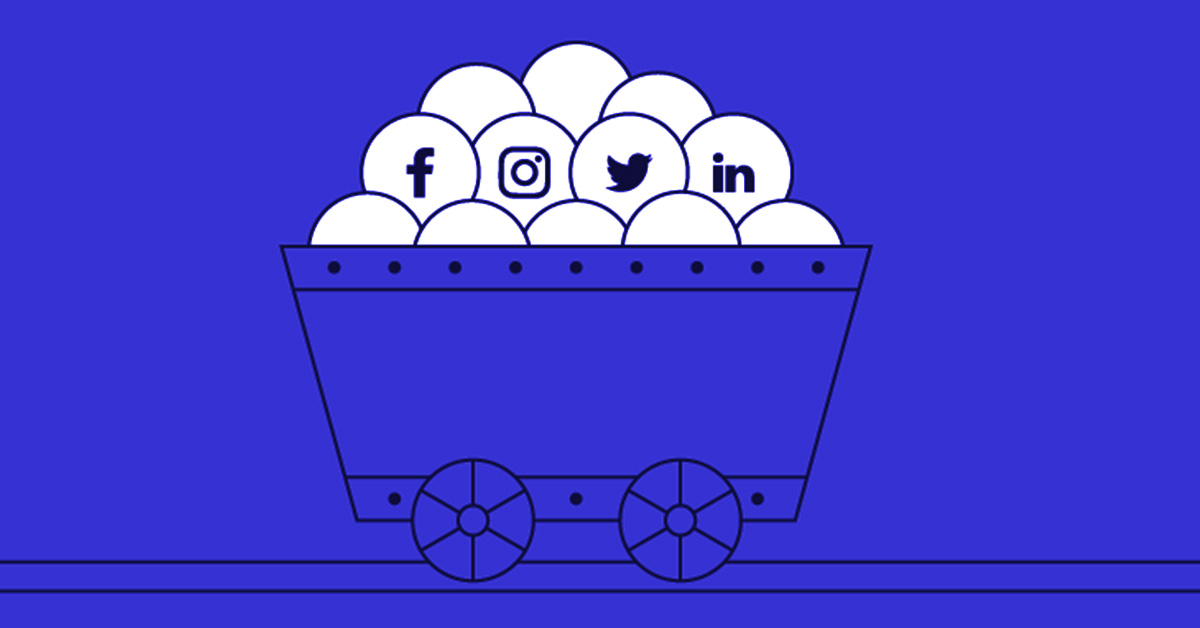
What is Data Mining?
Data mining involves extracting patterns and information from a large amount of data. It evaluates data from several viewpoints and summarizes it into something more useful. The process helps organizations make better decisions by uncovering hidden patterns and insights. Data mining techniques can identify trends and relationships in data. It analyzes customer behavior, identifies fraud, improves product recommendations, and optimizes business processes. The procedure of data mining requires skills in statistics, ML, and data analysis. You can combine data mining with web scraping for data extraction.
In a nutshell, one can scrape web data without mining data; but cannot mine data without extracting it.
Data Mining for Social Media Platforms

We will now look at what is social media mining and why people are mining it. Mining social media helps business owners to dig deeper into the market demographics. It provides a wealth of information to make informed decisions. Facebook data scraping generates data to understand user behavior, trends, preferences, and sentiments.
Data mining can be important for social media marketing, sentiment analysis, and monitoring. It enables businesses to learn about their customer preferences and identify trends. It allows organizations to detect crises and manage their reputation. Organizations do this by tracking social media activities. Data mining for social media includes data collection, preprocessing, analysis, and visualization.
What Type of Data to Extract from Facebook?

Here are some examples of data to extract from Facebook using appropriate APIs and tools:
- User Profile Information:
- Social Graph:
- Posts and Comments:
- Advertisements:
- Analytics:
As the title suggests, one can extract profile information from Facebook. It includes name, gender, location, age, education, relationship status, work history, and interests.
The social graph of Facebook has information about relationships between users. In other words, the relations between friends, family, and acquaintances.
One can extract data from publicly shared posts and comments. It includes text, images, and videos shared.
You can dive deeper into Facebook ads to extract information. It includes data such as ad performance, engagement, and targeting.
One can also extract data on the reach and engagement of Facebook pages. It includes likes, shares, and comments.
Best practices to measures to take for ethical data mining from Facebook
One of the best practices for ethical data mining is to respect Facebook's user privacy. The following are the best practices to consider when extracting data from Facebook:
- Follow Facebook's policies:
- Be transparent:
- Get user consent:
- Use Facebook APIs:
- Watch the usage of APIs:
The data mining activities should follow terms of service and data usage. In other words, you must respect Facebook's privacy settings. You should make sure to respect their legal or ethical standards.
Be explicit about your data mining activities. Also, provide users with clear information about using their data. Transparency can help to build trust and avoid any misunderstandings or concerns.
In most cases, it is necessary to get user consent before extracting and using their data. One can provide information about utilizing their data and obtaining explicit consent.
The social media platform provides APIs that enable developers to extract different data.
You must track your API usage to avoid exceeding the rate limits of Facebook. You can face API access blocks otherwise. There are monitoring tools used to keep an eye on the usage metrics to avoid any such blocks.
Follow these practices to ensure you adhere to Facebook's policies and rights.
Effective tools for Facebook data mining
Here are some examples of tools that are commonly used for data mining from Facebook.
Facebook Graph API:
API stands for Application Programming Interface. Facebook API gives access to the data and functionality for the developers. These developers then build applications that interact with the Facebook platform. Get an access token from Facebook's Developer portal to use Facebook API for data mining. It will allow you to authenticate your application with the servers and access the data.
Once you have the access token, you can use Facebook's Graph API to query data from Facebook. You can retrieve data from various Facebook objects. It can include data including - posts, comments, likes, and user profiles. Overall, data mining with Facebook API can be a powerful tool. It will help in extracting insights from Facebook's vast data. However, one must use it within its terms and conditions.
A Facebook web scraper:
A Facebook scraper is a software program that extracts data from Facebook. It includes getting information from pages, groups, and profiles. It can get information such as posts, comments, followers, and likes. It extracts data by parsing the HTML code of these pages. The web scraper sends HTTP requests to Facebook’s servers and receives the HTML code as a response. Then the scraper will parse the code and extract the required data. Some web scrapers also use automated bots to stimulate user behavior. It includes scrolling through a page to get their hands on the generated content.
How to use Web Scraping for Facebook Data Mining:
As step one, you need to get Facebook’s permission. After that, follow these steps to use web scraping for Facebook data mining –
- Identify the data you want to extract:
- Choose a web scraping tool:
- Identify the target Facebook page, group, or profile:
- Configure the web scraper:
- Run the web scraper:
- Analyze the extracted data:
Determine the data you want to extract from Facebook. You can consider posts, comments, likes, followers, or profile information.
Select a web scraping tool suitable for extracting the data you want. Some examples include Scraping Intelligence and Octoparse.
Specify the target Facebook page, group, or profile you want to scrape the data from the platform.
Set up the web scraper to extract the desired data from the target Facebook page, group, or profile. It may involve specifying the data fields you want to scrape. You can set up filters to limit the data to specific dates, keywords, or other criteria.
Launch the web scraper and let it run to extract the data from the target Facebook page, group, or profile. Depending on the size of the data set, this may take some time.
• Analyze the extracted data:
Conclusion
In summary, scraping Facebook for data mining can be useful for businesses, researchers, and marketers to better understand their target audience and create targeted advertising campaigns.







